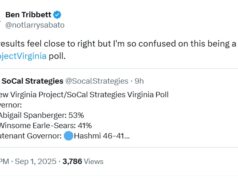Crossposted from Loudoun Progress. The rest of Virginia should be aware of what can only be called a racket – the creation of Watergate felon Chuck Colson that has attached itself to Loudoun County.
Rosalind Helderman of the Washington Post Virginia Politics blog tells us that Governor McDonnell is creating a new prisoner reentry initiative:
McDonnell signed an executive order establishing a Prisoner Reentry Council, headed by [Marla] Decker and the state’s first prisoner reentry coordinator Banci Tewolde. Membership will also include representatives of 16 government agencies. The group has been asked to come up with a blueprint for its work on July 1 and a new strategy by Dec. 31.
The initiative is “designed to help Virginia attack a recividism rate that now stands at 29 percent.” According to a Catholic Eye article on evaluating reentry programs from just last month, the national recidivism rate is 60-70 percent – so that rate seems remarkably low to begin with. It will be important to carefully evaluate the Virginia plan. The article cites the criteria for such an evaluation, noting that there are many claims of successful programs but very little rigorous evaluation or data that supports those claims.
These basic minimum criteria are taken from the text Crime: Public Policies for Crime Control:
A rigorous evaluation requires four things to be done: First, people must be assigned randomly to either the prevention program or a control group…Second, the prevention must actually be applied. Sometimes people are enrolled in a program but do not in fact get the planned treatment. Third, the positive benefit, if any, of the program must last for at least one year after the program ends. It is not hard to change people while they are in a program; what is difficult is to make the change last afterward. Fourth, if the program produces a positive effect…that program should be evaluated again in a different location.
My concern about the potential for abuse of this initiative is due to the presence of Prison Fellowship Ministries as a tax-exempt organization in our county. The close ties of the governor to PFM – he appointed as a policy analyst Mark Earley Jr., who “previously worked with Prison Fellowship Ministries, where his father is president and CEO,” and the elder Mark Earley is also of course the former Virginia attorney general who happened to accompany the governor on his pre-inauguration visit to a Virginia jail. The affinity of both the governor and the current attorney general for sectarian religious approaches to public policy is well known. I would not be at all surprised to learn that PFM had already been named as the initiative’s sole service provider in a private arrangement.
Prison Fellowship Ministries was granted tax exempt status by our Board of Supervisors in early 2004, and would otherwise be paying around $250,000 per year in property taxes on its large headquarters in Ashburn. If there were evidence that the kind of program the organization administers were effective, this would all be less concerning, but that evidence simply doesn’t exist. What does exist, however, is evidence that PFM has grossly misrepresented outcome data in order to claim success and garner political support. For example, the apparent stunning success of PFM’s InnerChange Freedom Initiative was gleefully announced by then-House Majority Leader Tom DeLay, along with a White House photo-op; here was proof that the kind of sectarian faith-based programs favored by the Bush administration were the answer. But when those results were examined, it turned out that the InnerChange participants were actually more likely than controls to be rearrested, and “noticeably more likely” to be reimprisoned. When reporting the results of the program, PFM had compared recidivism rates of only those inmates who had completed their program with the recidivism rates of all participants in the comparison programs – including those who dropped out, were kicked out, or got parole.
InnerChange started with 177 volunteer prisoners but only 75 of them “graduated.” Graduation involved sticking with the program, not only in prison but after release. No one counted as a graduate, for example, unless he got a job. Naturally, the graduates did better than the control group. Anything that selects out from a group of ex-inmates those who hold jobs is going to look like a miracle cure, because getting a job is among the very best predictors of staying out of trouble… Naturally, the non-graduates did worse than the control group. If you select out the winners, you leave mostly losers. [Emphasis added]
This is a methodological no-no called selection bias. The less polite term for it is “cooking the books.”
Researcher Dan Mears, of the Florida State University College of Criminology and Criminal Justice, has reviewed many such claims – and singled out PFM for criticism.
Unfortunately, anecdotes are many and clear answers few in the spate of methodologically flawed research currently being offered up to policymakers as proof of efficacy, concluded Mears and fellow reviewers at the Urban Institute in Washington, D.C. “Despite the call for evidence-based programs and policies instead of belief- and emotion-driven ones, current faith-based prisoner reentry programs don’t remotely constitute evidence-based practice,” Mears said.
As an example, Mears cites the Prison Fellowship Ministries, founded by Charles Colson, the former Nixon aide who became a born-again Christian while imprisoned for his part in the Watergate scandal. Colson has touted the success of his ministries based on studies that show lower recidivism rates among participants. However, Mears noted that the studies focused only on inmates who completed the program, while comparing its recidivism rates to those of all participants-including dropouts-of selected secular programs.
In fact, if recidivism rates in Colson’s programs were revised to include all participants, “graduates” or not, results would be worse than those for the comparison groups. Where successes might be construed to exist, it’s unclear what to credit-the computer and life skills classes or its fundamentalist Christian doctrine. Where recidivism increases among its program participants, did faith-based programming play a part by leading some inmates to believe that ultimate responsibility for their actions lies with God, not them? Like arguments that faith-based programs decrease recidivism, this possibility remains to be demonstrated empirically.
“Unquestionably, faith-based programs that rely exclusively on volunteers and require no in-kind contributions from correctional systems entail few costs,” Mears said. “Yet, important questions remain about what exactly a faith-based program is, why such programs should be expected to be effective and whether they are, and not least, particularly where some degree of coercion is possible, the appropriateness of using any taxpayer dollars for religious programming.”
The costs, in our case, are already being borne by Loudoun taxpayers. “Coercion” is yet another problem with the Prison Fellowship Ministries record, a problem that will be explored in a later post.





![Monday News: Trump’s Lunacy Pushes China, Russia, India, etc. Together; “Happy Labor Day. Donald Trump and Elon Musk Are Screwing Workers.”; “Where is the [media’s] intense focus on Trump’s failing health?”; ““Trump says he is not a dictator. Isn’t he?”](https://bluevirginia.us/wp-content/uploads/2025/09/montage0901-238x178.jpg)








